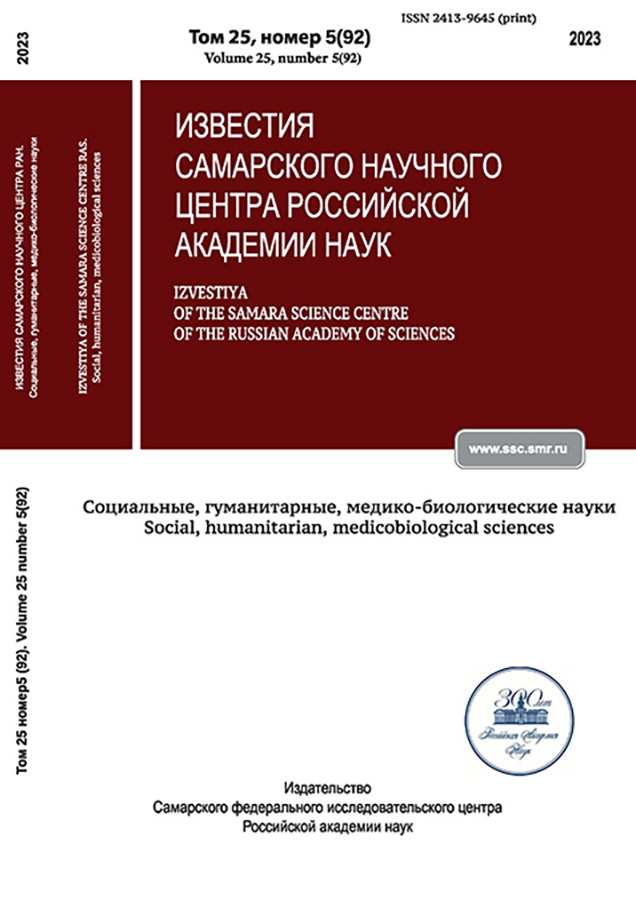Differentiation of the public by the level of orientations to stage art
- Authors: Grebenik E.N.1
-
Affiliations:
- Lugansk State Academy of Culture and Arts named after Mikhail Matusovsky
- Issue: Vol 25, No 5 (2023)
- Pages: 79-84
- Section: HUMANITIES SCIENCES
- URL: https://journals.eco-vector.com/2413-9645/article/view/623066
- DOI: https://doi.org/10.37313/2413-9645-2023-25-92-79-84
- ID: 623066
- Retraction date: 12.02.2024
- Retraction reasons description:
The article by E.N. Grebenik, "Differentiation of the public by the level of orientations to stage art" (Izvestiya of the Samara Russian Academy of Sciences scientific center. Social, humanitarian, medicobiological sciences. 2023; 25(5):79–84, https://doi.org/10.37313/2413-9645-2023-25-92-79-84), has been retracted based on the information received by the editorial office about plagiarism and the incorrect interpretation of results from other studies, which calls into question the scientific value of the work. The articles used without proper citation and not mentioned in the References: A.A. Ushkarev, "The Audience of Art in Social Dimensions". St. Petersburg, Aleteya, 2019. 660 pp. ISBN 978-5-907115-14-9 (In Russian); A.A. Ushkarev, "Typology of Leisure Behavior". Observatory of Culture. 2017; 14(2):148–156. (In Russian) https://doi.org/10.25281/2072-3156-2017-14-2-148-156; A.A. Ushkarev, "Theater and Spectator". Scene. 2020; 1(123):7–13 (In Russian); A.A. Ushkarev, "Theatre Audience: Breaking Stereotypes". Voprosy Teatra. Proscaenium; 2018; 1–2:437–451. (In Russian) http://theatre.sias.ru/upload/voprosy_teatra/2018_1-2_437-452_ushkarev2.pdf).
Cite item
Full Text

Abstract
At the moment, an important feature of the existence of the theater as a socio-cultural institution is its functioning in market conditions. Performances become the subject of sale and purchase, and the hedonistic function of the theater is opposed by great competition: cinema, the Internet, social networks, entertainment shows and show programs. In this regard, in order to remain in the consumer market, the theater uses innovative technologies and experimental forms, which lead to the loss of the uniqueness of the theater and a decrease in the level of the public. The effective implementation of the ideological and educational functions of the theater is directly related to the level of training of the theatrical public. The questions of his typology, the classification of the level of art education, are decisive in the perception of the performance. The genre orientation and subject orientation of theaters certainly depend on the ability of the public to perceive works of theatrical art. The article deals with the analysis of sociological studies of the interaction of the individual with art, as well as the study of sociocultural processes that form the orientation of the theater audience towards works of theatrical art. The author of the article pays special attention to the leisure activities of individuals and the formed stereotypes of the theatrical audience. The author also carried out an analysis of the cultural and leisure behavior of the public and derived the differentiation of the public according to the level of orientations and preferences for the performing arts.
Keywords
About the authors
Ekaterina N. Grebenik
Lugansk State Academy of Culture and Arts named after Mikhail Matusovsky
Author for correspondence.
Email: deepkatya@mail.ru
senior lecturer of the department of theater arts
Russian Federation, LuganskReferences
- Burd'ye, P. Formy kapitala (Forms of capital) / P. Burd'ye. – Tekst : neposredstvennyy // Ekonomicheskaya sotsiologiya. – 2002. – T. 3, № 5. – S. 60–74.
- Kont, O. Sotsial'naya psikhologiya: uchebnoye posobiye (Social psychology: textbook) / O. Kont ; otv. red. A. L. Zhurav-lev. – M. : PER SE, 2002. – 351 s.
- Radayev, V. V. Sotsiologiya potrebleniya: osnovnyye podkhody (Sociology of consumption: basic approaches) / V. V. Radayev, – Tekst : neposredstvennyy // Sotsiologicheskiye issledovaniya. – M., 2005. – S. 5–18.
- Rubinshteyn, A. YA. Segmentatsiya teatral'nogo rynka (Segmentation of the theatrical market) / A. Rubinshteyn, N. Skomorokhova, G. Gedovius, – Tekst : neposredstvennyy // Khudozhestvennaya zhizn' sovremennogo obshchestva. V 4-kh t. [Iskusstvo v kontekste sotsial'noy ekonomii / Otv. red. A. YA. Rubinshteyn]. –SPb., 1998. – T. 3. – S. 226–248.
- Sotsiologiya kul'tury: ucheb. posobiye (Sociology of culture: textbook. allowance) / Ye. N. Narkhova, D. YU. Narkhov ; Ministerstvo nauki i vysshego obrazovaniya Rosiyskoy Federatsii, Ural'skiy federal'nyy universitet. – Yekaterinburg : Izd-vo Ural'skogo universiteta, 2019. – 302 s.
- Strumilin, S. G. Problemy ekonomiki truda: monografiya (Problems of labor economics: monograph) / S. G. Strumilin ; [otv. red. i avt. predisl. M. YA. Sonin]; Akademiya Nauk SSSR, Institut ekonomiki. – M. : Nauka, 1982. – 470 s.
- Ushkarev, A. A. Auditoriya khudozhestvennykh muzeyev: istoriya i metodologiya izucheniya v Rossii (The audience of art museums: history and methodology of study in Russia) / A. A. Ushkarev, – Tekst : neposredstvennyy // Kul'tura i iskusstvo. – 2017. – № 7. – S. 36–49.
- Ushkarev, A. A. Kul'turnyy kapital kak drayver potrebleniya iskusstva (Cultural capital as a driver of art consumption) / A. A. Ushkarev, – Tekst : neposredstvennyy // Observatoriya kul'tury. – 2018. – №15(2). – S. 178–187.
- Ushkarev, A. A. Statusnaya motivatsiya potrebleniya iskusstva (Status motivation for the consumption of art) / A. A. Ush-karev, – Tekst : neposredstvennyy // Kul'tura i iskusstvo. – 2018. – № 6. – S. 1–12.
- Fokht-Babushkin, YU. U. O kul'turnykh potrebnostyakh moskvichey (On the cultural needs of Muscovites) / YU. U. Fokht-Babushkin, – Tekst : neposredstvennyy // Kul'tura i kul'turnyye potrebnosti moskvichey. – M., 2010. – S. 11–108.
- Khrenov, N. A. Publika v istorii kul'tury. Fenomen publiki v rakurse psikhologii mass: monografiya (Public in the history of culture. Phenomenon of the public from the perspective of the psychology of the masses: monograph) / N. A. Khrenov. – M. : Agraf, 2007. – 496 s.
Supplementary files







